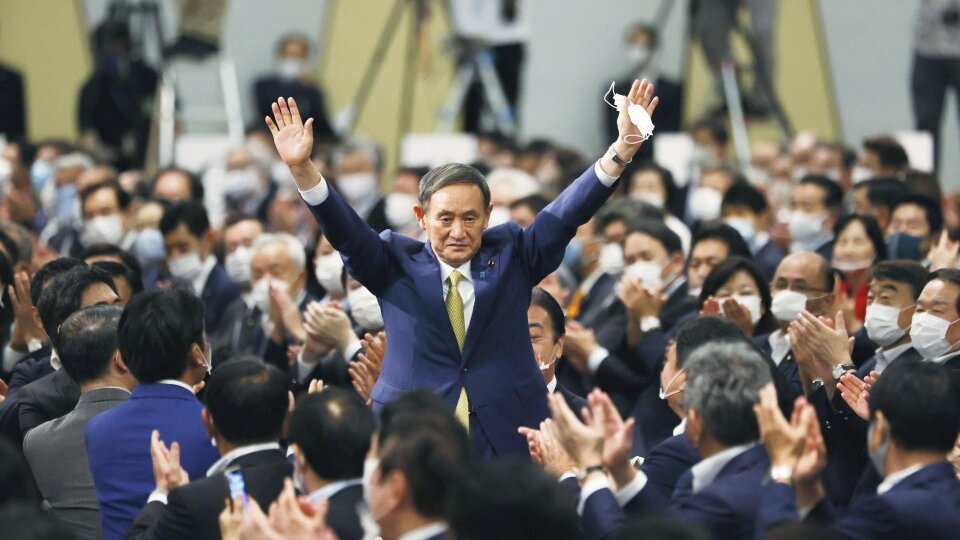Yoshihide Suga succeeds Shinzo Abe as new Japan PM

TEHRAN- After getting the backing of the majority of his party lawmakers and representatives, Yoshihide Suga, the chief Cabinet secretary of outgoing Prime Minister Shinzo Abe, is on the course to become Japan’s new leader on Wednesday.
In a vote at a meeting of ruling Liberal Democratic Party lawmakers, he was elected as the party's new president, a move that paved the way for him to take over as Japan’s new prime minister. The top government spokesman faced two rivals in the LDP vote. Former Defense Minister Shigeru Ishiba and former Foreign Minister Fumio Kishida both contended against Suga but failed to receive the majority vote of the LDP. Suga, Kishida, and Ishiba received 377, 89, and 68 votes respectively.
Suga campaigned on keeping a balance between fighting the coronavirus pandemic and shoring up economic activities and unexpectedly won by a landslide in the LDP presidential election Monday. Abe imagined that Kishida would succeed him and the public initially favored Ishiba.
“We must inherit and promote the efforts that Prime Minister Abe has made so that people can overcome the crisis and live a safe and stable life,” Suga said. “It is important to rebuild the economy while also containing the coronavirus at the same time. It's not something I will do as soon as the virus is brought under control either.”
Suga’s rise came after Abe, the longest-serving prime minister in Japan’s history in terms of consecutive days in office, announced on August 28 that he will be stepping down due to a relapse of an intestinal disease called ulcerative colitis. Therefore, his tenure as LDP president would be limited to a little bit more than a year. Because Abe’s current three-year term will end on September 2021 and that new election must be held on October 21 that year.
Suga was born on December 6, 1948, in Akita Prefecture to a farmer father and schoolteacher mother. During his childhood, he worked with his father in strawberry fields reluctantly as he was unwilling to become a farmer and eventually “ran away from home” to find work in Tokyo after he finished high school. He later enrolled at Hosei University in 1969.
Suga is known for his aversion to the spotlight. That’s why he was unknown to the public until April last year, when his unveiling of Japan's new imperial era name earned him the nickname “Uncle Reiwa” along with a popularity boost, according to the Japanese Kyodo news agency.
The chief cabinet secretary is taking the helm at a time when the country is grappling with the coronavirus pandemic and economic slump. So he is expected to take measures to promote economic activities while mitigating the pandemic’s negative impacts on the country.
As a top spokesman for the government under Abe, Suga has expressed Japan’s positions on a range of foreign policy issues including Iran. When Abe paid a visit to Iran in June 2019, Suga constantly made remarks about Abe’s mediation efforts between Iran and the U.S. He said at the time that Abe has discussed tensions around a 2015 nuclear deal between Iran and world powers twice.
Back then, Abe sought to mediate between Iran and the U.S. in a bid to calm tensions in the region. The then-prime minister also delivered a message from U.S. President Donald Trump to the Iranian leadership. But Iran refused to reply.
Recently, Kyodo revealed that Abe “secretly proposed the barter of Iranian crude oil for U.S. grain via Japan last year.” According to Kyodo, “The plan envisaged circumventing U.S. sanctions on Iran by exchanging U.S. corn and soybeans procured from the United States by Japan for Iranian crude oil, and to transport these after obtaining U.S. approval.”
The Abe mediation efforts hit a dead end due to U.S. refusal to lift the sanctions on Iran before entering any negotiations with the country. However, Suga has said that he will be continuing the policy of his predecessor in terms of seeking diplomatic solutions to crises. And that Suga may resume the Abe mediation efforts once he took over.
SM/PA
